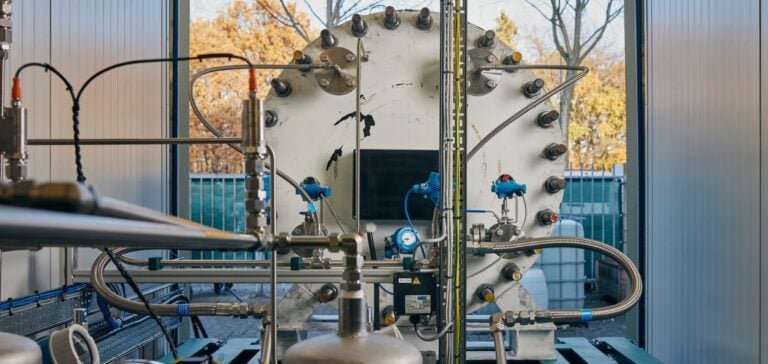Battolyser Systems raises €30 million in a Series A financing round involving Global Cleantech Capital, Innovation Industries and Invest-NL.
The deal comes against a backdrop of strong demand for low-carbon energy solutions, and marks a key step in the commercial expansion of its electrolyzer combining battery functionality.
By capitalizing on this hybrid technology, the Dutch company aims to establish itself on the European green hydrogen market.
An innovative electrolyser at the heart of energy challenges
The Battolyser Systems electrolyzer stands out for its ability to combine electrolysis and energy storage.
This hybrid approach provides maximum flexibility, particularly in environments where renewable electricity production is variable.
Thanks to this technology, the electrolyzer can adapt to fluctuating electricity prices and optimize green hydrogen production.
This is a strategic advantage, not only for reducing costs, but also for offering an alternative solution to grid congestion problems.
Industrializing this technology requires substantial investment.
The recently secured financing, in part thanks to the support of Global Cleantech Capital, Innovation Industries, and Invest-NL, is enabling Battolyser Systems to build a large-scale manufacturing plant in the port of Rotterdam.
This infrastructure is designed to meet the growing demand from the European market, considered to be an epicenter of green hydrogen production.
Institutional players committed to the energy transition
The financial support from Invest-NL, the Dutch national promotional institution, underlines the importance of the electrolyzer in the Netherlands’ decarbonization strategy.
Complementing this support, a €40 million financing agreement with the European Investment Bank (EIB) strengthens Battolyser Systems’ ability to develop large-scale production.
This combined financing illustrates a strategic interest in technologies capable of contributing to the energy transition.
The EIB’s involvement in this project also marks a first in support for a Dutch company specializing in the climate sector.
This decision testifies to the willingness of European institutions to stimulate innovations that meet carbon neutrality objectives.
By supporting technologies such as Battolyser Systems’, the EIB aims to encourage solutions that make optimal use of renewable energies.
Green hydrogen market trends and prospects
The fast-growing green hydrogen market is structured around the search for technologies that ensure both efficiency and profitability.
Battolyser Systems’ electrolyzer, with its ability to absorb and store intermittent renewable energy, offers an answer to this complex equation.
As part of the energy transition, this solution could play a decisive role, particularly in energy-intensive sectors such as industry and transport.
The technology patented by Battolyser Systems, using nickel-iron electrodes, offers a competitive alternative to conventional electrolysis solutions.
Robustness and efficiency are key criteria for investors and industry players seeking to maximize their return on investment while contributing to the decarbonization of energy systems.
Implications for industrial and political players
For governments and businesses alike, supporting the development of green hydrogen has become a strategic priority.
In Europe, and particularly in the Netherlands, public policies favor investment in infrastructures dedicated to hydrogen production and storage.
The location of Battolyser Systems’ new plant in the port of Rotterdam fits perfectly with these objectives, offering a synergy between technological innovation and industrial policy.
Statements by the heads of Global Cleantech Capital and Innovation Industries emphasize the importance of the technological flexibility offered by Battolyser Systems.
This flexibility would make it possible to respond not only to fluctuations in the energy market, but also to the growing demand for clean fuels in off-grid contexts.
Next steps for Battolyser Systems
Bolstered by this funding, Battolyser Systems is now focusing on ramping up production and bringing its electrolyzer to market.
The aim is to launch an improved version of the electrolyzer by 2025, capable of adapting even more finely to market conditions and regulatory requirements.
This development is part of a dynamic in which green hydrogen is becoming an essential vector in Europe’s energy transition.
The impact of these innovations will be felt not only on the energy front, but also on the economic front, with potential implications for the industrial value chain.
The Port of Rotterdam, already at the heart of Europe’s hydrogen ambitions, could see its strategic role strengthened by this new infrastructure.






















